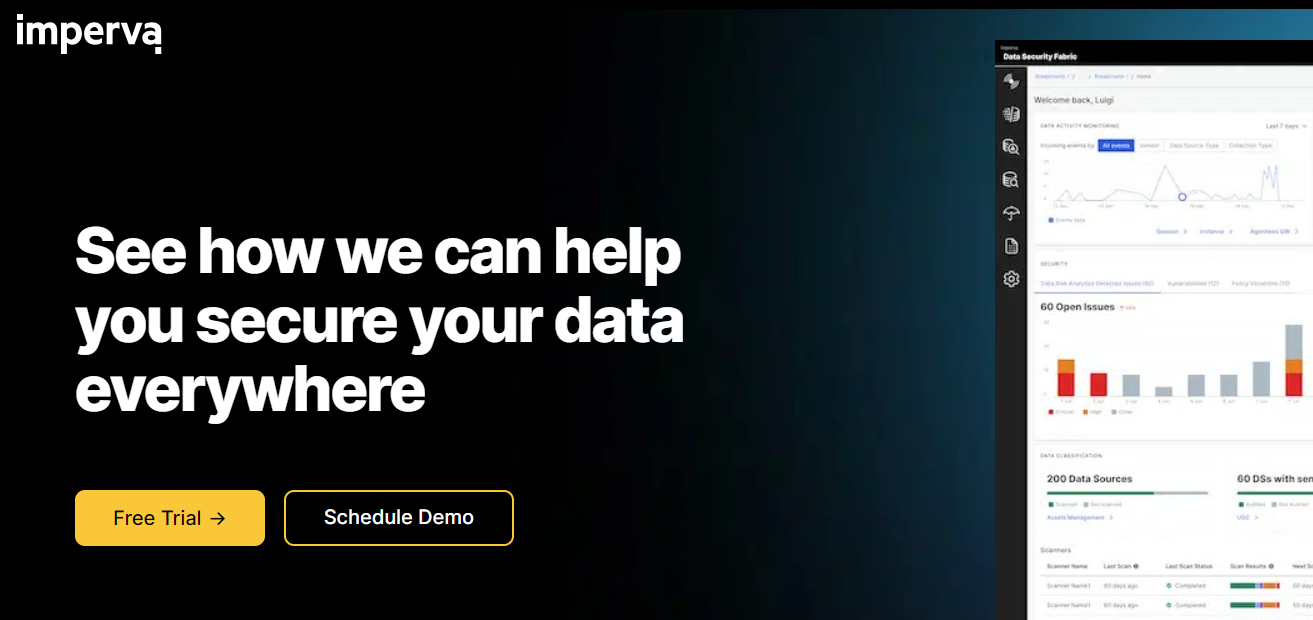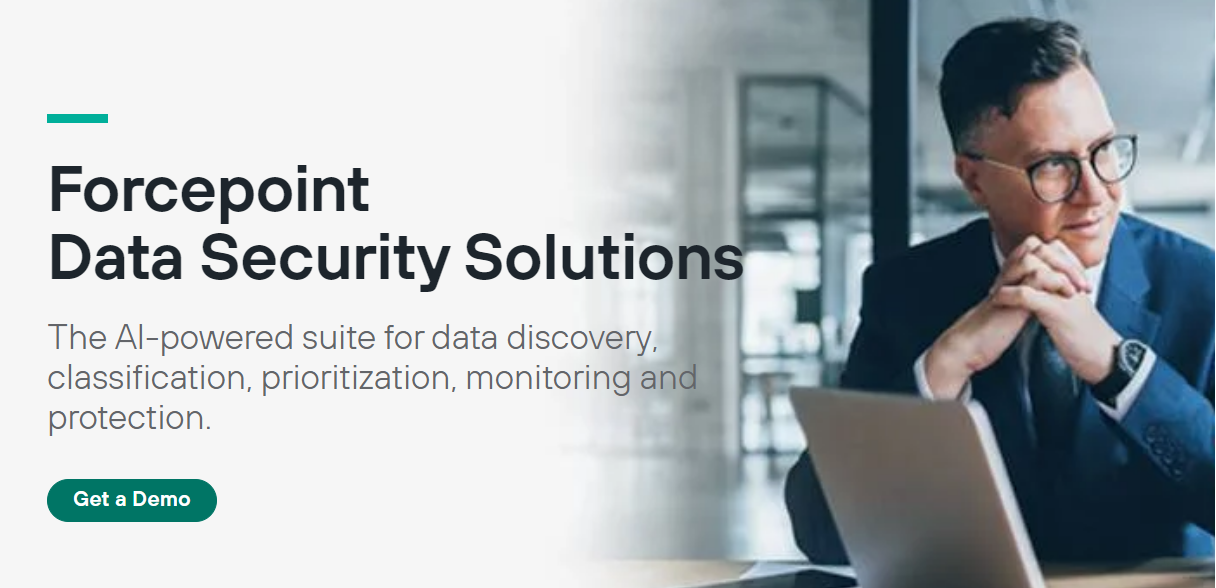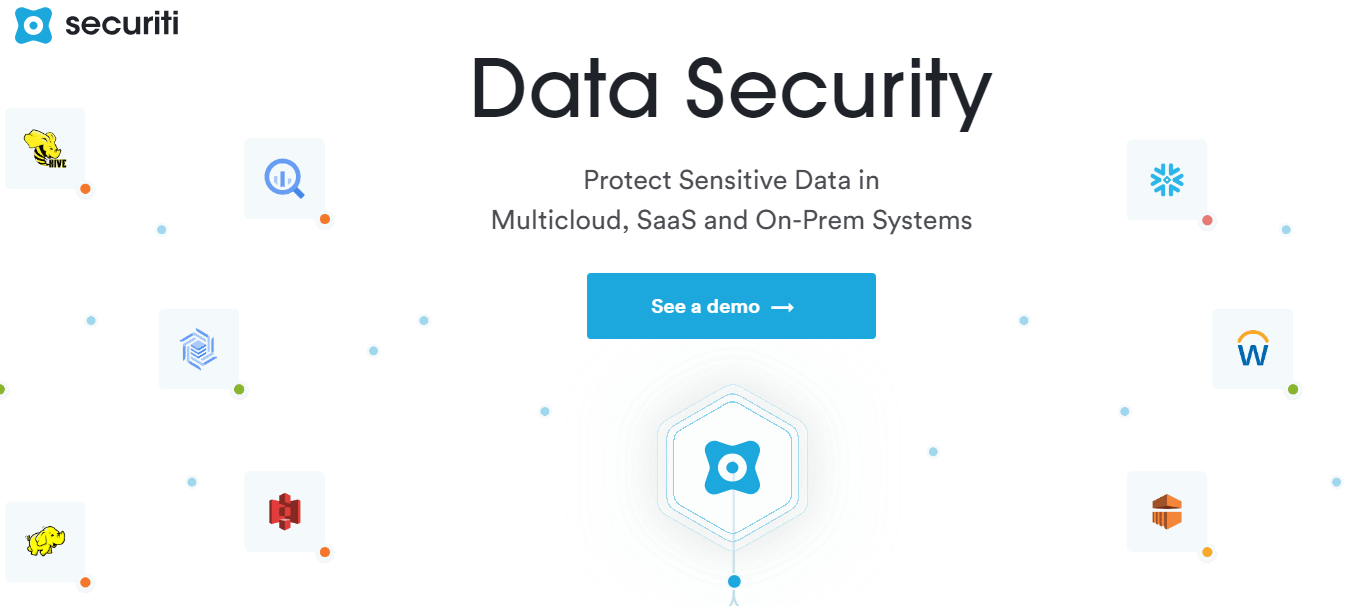Data is essential for organizations today. Good data can help your business gain insights into your customers’ minds, make informed business decisions, and establish benchmarks to keep moving forward.
As organizations increasingly rely on data to operate efficiently, threat actors devise innovative ways to get hold of organizations’ sensitive data.
So you must implement data security solutions in your company to protect critical data from threat actors. Besides, most organizations these days are legally bound to protect their customers’ data.
Best Data Security Solutions
We have listed the top data security solutions below. The list will help you pick the right tool to meet your data security requirements. At the end of the list, we’ll also discuss in detail about data security, its benefits, why your business needs it, and how your business can take advantage of these solutions.
Let’s jump into the list!
Cyera

Cyera offers a reliable solution for protecting sensitive data. Its single cloud-native platforms offer your organization:
- Sensitive data discovery and classification
- Data security posture management
- Cloud data loss prevention
- Data access governance
- Automated risk remediation workflows
And the best thing about Cyera is it can discover, classify, and protect data across multiple environments, including software-as-a-service (SaaS), platform-as-a-service (PaaS), and infrastructure-as-a-service (IaaS).
It can also help you prepare for the future by focusing on strong security policies to limit the impact of data exposure.
Imperva

Imperva is one of the industry’s most complete data security solution providers. It covers 65+ data repositories, from legacy to cloud and hybrid, and helps you know:
- Where your sensitive data resides
- Who access it
- When it is abused
With Imperva, you will have a unified platform for data discovery, classification, and threat analytics. It offers:
- Critical insight, including sensitive data location, users, access, and risk
- The context in data activity to fill in gaps for incident investigations rapidly
- Legacy structured database protection to secure modern cloud data architectures.
What’s more, it comes with 260 built-in integrations to speed up investigation and response. And it allows you to enforce data security policy automatically.
SpinOne

If you are looking for a data security solution to protect SaaS data, SpinOne from Spin.AI is the right tool. SpinOne offers complete SaaS data protection. It proactively protects your data from ransomware, shadow IT, Data leaks, and other threats.
SpinOne comes with many advanced features, which include but are not limited to:
- Misconfiguration visibility and management
- Security policies
- Ransomware monitoring, detection, and remediation
- Data management and recovery
- Shared data audit
- PII data audit
- Blocklist/Allowlist management
- Application scoring
Also Read: Prevent Ransomware: Proactive Measures to Keep Your Data Safe
SpinOne supports multiple data centers, including AWS, GCP, Azure, and more.
Nordlayer

Secure Access Service Edge (SASE) offers organizations comprehensive security through shielded visibility, data protection, and enhanced edge-to-edge security for all devices within a network. Applying SASE with Nordlayer solutions can help you resolve security challenges in multiple areas, including:
- SaaS security
- Threat prevention
- Workforce transformation
- Secure remote access
- Working from home safely
- Controlled move to cloud services
- Performance assurance
Key features of Nordlayer SASE framework include Zero Trust, Firewall as a Service (FWaaS), Cloud Access Service Broker (CASB), Secure Web Gateway (SWG), and Device Posture Security.
Forcepoint

Forcepoint’s AI-powered suite for data discovery and classification, prioritization, monitoring, and protection offers reliable data security. Forcepoint makes all your enterprise data visible. You can see where your data resides, from endpoints and data centers to multiple clouds.
With this security suite, you can:
- Find and fix exposures of data
- Manage levels of data access
- Monitor and manage risk levels
- Get unified data protection coverage
- Receive behavioral awareness
- Enforce data security policy
- Reduce redundant, obsolete, and trivial data
Forcepoint prevents data loss on the cloud and on-prem devices. It also helps you stay compliant with security standards covering 150+ regions across 90+ countries.
Dig

Dig is one of the most reliable data security platforms. Its single solution offers:
- Data security posture management
- Data leak prevention (DLP)
- Data detection and response (DDR).
Dig Security’s data protection solution offers instant visibility into your static data risk, including advanced filtering capabilities on all available cloud security measures.
It protects your cloud infrastructure from the following threats:
- Ransomware
- Shadow data
- Dada misuse
- Data exfiltration
- Non-compliance with data protection regulations
It prioritizes data security posture issues based on context to minimize the number of alerts. This prevents alert fatigue.
Securiti

Securiti’s DataControls Cloud protects sensitive data in the cloud and on-prem devices. It allows you to leverage granular insights into the data to assess risks and prioritize the remediation of misconfigurations. What’s more, Securiti’s DataControls Cloud lets you get insights into whose data may be impacted by a data breach and which regulations apply.
It can help your organization with the following:
- Managing data security posture
- Preventing unauthorized access to sensitive data
- Managing the flow of sensitive data
- Monitoring data risks
- Analyzing data breach impact
- Automating data privacy obligations
- Managing data consent
- Analyzing data lineage
- Building custom workflows
Securiti’s DataControls Cloud helps you visualize data risks with a risk graph and enforce guardrails to prevent unauthorized access.
GuidePoint Security

GuidePoint Security is a leading company offering data security services tailored to the customized needs of organizations.
The company will help your organization in:
- Assessing existing cyber security posture
- Identifying gaps and vulnerabilities
- Removing security solutions that don’t offer optimum security
- Suggesting security products and controls that can minimize data security risks
- Indexing data security practices in individual business units
- Optimizing internal training programs to enhance data security
- Deploy security technology that is custom fit to your environment
- Leveraging technical innovation required to create a secure IT environment
GuidePoint Security will also help prepare your organization to adhere to corporate and regulatory policies.
Now that you’ve checked out the best data security solutions available in the market, let’s dive into the 101 for data security. This will be especially beneficial if you haven’t handled data security or used data security solutions for your business.
What Is Data Security?

Data security refers to protecting data from unauthorized access, corruption, accidental loss, or theft throughout the entire data lifecycle, from data creation to destruction.
The objective of data security is to preserve its confidentiality, integrity, and availability. It encompasses software, hardware, storage devices, and user devices. And the data security process also includes organizations’ policies and procedures.
Data security comes with several advantages, whether you’re using these solutions for an organization or for personal reasons.
Benefits of Data Security
Securing data can provide your organization with multiple benefits, such as:
- Enforcing data security ensures adherence to data protection regulations. Non-compliance with data security regulations can result in huge fines.
- Data security solutions minimize disruptions and ensure business continuity.
- By safeguarding critical data, you minimize the chances of data exposure. This builds trust with customers and stakeholders.
As a result, you can prevent various malware attacks and social engineering attacks.
Data security implementation is a must for businesses. Let’s find out why.
Why Your Business Needs Data Security

Growing incidents of data breaches prove that hackers are perpetually trying hard to access sensitive data. In fact, data breaches exposed more than 6 million data records worldwide during the first quarter of 2023 alone.
Any data breach, even if it is minor, can cause irreparable damage to your brand, including financial and reputational loss. A data breach can be detrimental to your business if you are an online business. This is because 81% of people would stop engaging with a brand online after a data breach incident. That said, data security is crucial for businesses, irrespective of their sizes.
You can check these cybersecurity compliance software programs to meet compliance requirements.
Apart from the growing need for businesses to use data security solutions, they can also help your business in multiple ways.
Data Security Solutions and How They Help Businesses

Here are popular data security solutions organizations implement to protect sensitive information.
Data Discovery and Classification
Data discovery is a process of scanning your entire IT environment to locate and identify where structured and unstructured data reside.
On the other hand, data classification is a process to determine the type of data you have found and tag the data to organize it into different categories based on content type, file type, and other metadata.
A data discovery and classification solution helps you gain complete visibility into your data and focus on the most vulnerable areas to enhance data security.
Firewall
Available as computer hardware and software, a firewall works as an intermediary between your internal network and outside traffic.
It protects your network from unwanted incoming traffic by allowing only configured incoming connection requests.
You can check these open-source firewall programs to protect your network.
Access Control
Access control is a data security policy that helps you manage who is authorized to access data.
Through authentication and authorization, access control ensures that users are who they claim to be and are authorized to access the data.
To enhance data security, you should implement role-based access control (RBAC), in which access to data is granted based on defined business functions rather than the user’s identity or seniority.
Also, you should implement a strong password policy to discourage users from using common passwords.
Data Masking
Your organization may be required to use sensitive data for various in-house operations such as software testing, sales demos, or user training. Offering original data for these purposes weakens data security.
Data masking or data obfuscation is the process of modifying organizational data in such a way that it doesn’t offer any value to unauthorized users, but the data remains fully functional.
So start using a data masking tool to obfuscate data before handing it to interns, developers, or the public for business reasons.
Intrusion Detection and Prevention System (IDPS)
As the name suggests, an Intrusion detection and prevention system (IDPS) monitors events in a system or network and analyzes those events for signs of possible incidents. And then, it attempts to stop detected potential incidents to protect a system or network.
Implementing an IDPS can enhance data security in the organization as the system will stop hackers from gaining access to your file systems using malware.
Security Information and Event Management
Security Information and Event Management (SIEM) is a security solution that helps companies recognize and address potential threats and vulnerabilities before they can cause business disruption.
SIEM solutions collect event log data from on-premises and cloud environments and analyze logs in real-time. So they can detect advanced and unknown threats to your sensitive data, including insider threats, ransomware threats, or data exfiltration.
Data Loss Prevention (DLP)
As the name suggests, data loss prevention (DLP) is a strategy for identifying and helping prevent the unsafe, unauthorized use, sharing, and transferring of sensitive data.
There are two core functions of data loss prevention solutions: identifying sensitive data like personally identifiable information and preventing the loss of such data. And they protect your sensitive data when the data is in use, in motion, and at rest.
So, it is imperative to implement a good data loss prevention system. And if most of your data sits in the cloud, you should also consider using a good cloud data protection platform.
Data Encryption

Encryption is one of the most effective data protection solutions you can use for protecting sensitive data.
When you encrypt files containing sensitive data, you turn plain text (that humans can read) into cipher text that no human or machine can read. Consequently, threat actors will see gibberish if they get access to your data. Users having a decryption key can turn cipher text into plain text (readable data).
Also Read: How to Encrypt Files to Protect Personal and Business Data?
Mobile Device Management (MDM)
A mobile device management (MDM) solution makes monitoring and managing multiple mobile devices easier.
Moreover, an MDM tool allows you to enforce security policies across all devices with access to sensitive data.
You can also locate a misplaced or lost device and remotely wipe sensitive data from a lost device with the help of an MDM tool.
Also Read: Best MDM Software Solutions for Small Businesses to Enterprises
Data Backup

Backing up your critical data is a must. This is because data backups can help protect your data against hardware failure, human error, ransomware attacks, power failures, and natural disasters.
So start backing up critical data assets. Implement the 3-2-1 data backup policy for sensitive data protection. In this policy, you will be creating three copies of data and save them on two different media with one copy offsite.
You can explore these popular enterprise data backup solutions for medium to enterprise businesses to pick the best solution for your organization.
Physical Security
Physical security plays a crucial role in protecting your organization’s data. Poor or inadequate physical security can lead to a data breach. So take the necessary steps to amp up physical security in your company.
Here are some tips to get started:
- Make an inventory of business devices to know where they are, who uses which device, and whether they can take them outside your business premises.
- Limit access to areas with sensitive data or devices. Only authorized people should have access to these areas.
- Install video cameras to monitor areas with sensitive data and devices.
Also, consider locking down each workstation so none can move to another place.
Employee Training
Your employees are the weakest link in data security. You may encrypt sensitive data, encourage employees to create strong passwords, or have the best data security platform. However, a phishing email can trick them into sharing their login credentials with a threat actor.
So, run security awareness training programs in your organization regularly to help them spot phishing campaigns, detect malvertising, understand password hygiene, and follow cybersecurity best practices.
Conclusion
With data breach incidents proliferating, protecting your organization’s sensitive data becomes crucial. Failing to do so can result in data exposure, causing substantial financial and reputational damage to your brand. To implement the right data security solutions to amp up data security in your organization.
More On Security Solutions
- Information Security Management System (ISMS) Explained in 5 Minutes or Less
- Disaster Recovery Solutions for Small to Medium Businesses
- Best DNS Filtering Solutions for Your Business
You can trust Geekflare
At Geekflare, trust and transparency are paramount. Our team of experts, with over 185 years of combined experience in business and technology, tests and reviews software, ensuring our ratings and awards are unbiased and reliable. Learn how we test.

